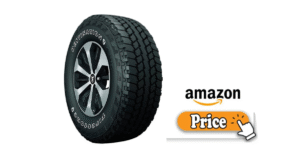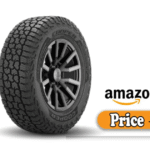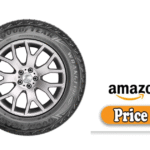When it comes to buying new tires, one name consistently comes to mind: Firestone. Known for innovation, reliability, and performance, Firestone has carved a solid reputation over the decades.
Whether you’re a daily commuter, an off-road adventurer, or just someone looking for dependable tires for all weather conditions, Firestone likely has a tire to suit your needs. In this guide, we’ll explore why Firestone tires for sale are worth your attention.
We’ll break down the strengths and possible limitations, share personal experience, assess design and performance, compare alternatives, and answer the most frequently asked questions. Let’s roll into it.
What I Like
Reputation and Heritage
Firestone isn’t a newcomer to the game. Founded in 1900, it’s one of the oldest tire manufacturers in the U.S. That kind of longevity doesn’t happen by accident. Firestone’s name has been built on trust, innovation, and performance.
Versatile Tire Lineup
From the rugged Destination A/T2 for off-road warriors to the efficient and smooth Firestone WeatherGrip for all-season driving, the variety is impressive. There’s something for every vehicle type, every road condition, and every budget.
Affordable Pricing
When browsing Firestone tires for sale, one of the first things you’ll notice is the competitive pricing. While not always the cheapest, Firestone offers tremendous value for money without sacrificing essential features like grip, wear resistance, and ride comfort.
Wide Availability
You can find Firestone tires almost anywhere at local dealers, online marketplaces, and Firestone Complete Auto Care centers across the country. Availability is a massive plus when you need replacements quickly.
Warranties That Build Confidence
Many Firestone tires come with excellent warranties, some of which are up to 70,000 miles. This gives peace of mind and reflects the manufacturer’s confidence in its product.
What Could Be Better
While Firestone generally hits high marks, no product is without room for improvement.
Noise on Some Models
Some users report a slightly higher noise level, especially with all-terrain tires like the Destination A/T. While not a deal-breaker, it’s worth noting if cabin quietness is a top priority.
Wet Weather Performance Variance
Although most Firestone tires perform admirably in rain, a few models (particularly older ones or those designed primarily for dry climates) show reduced traction during heavy rainfall.
Not Always the Top Performer in High-End Segments
In ultra-high-performance categories, competitors like Michelin or Continental may edge out Firestone. That said, Firestone often comes at a significantly lower cost. 👉🏿👉🏻 Check the Latest Price and Offer at Amazon 👈🏻👈🏿
👉🏿👉🏻 Check the Latest Price and Offer at Amazon 👈🏻👈🏿
My Personal Experience
As a long-time user of Firestone tires, having tried the Firehawk Indy 500, Destination LE3, and WeatherGrip on different vehicles, my journey has been largely positive.
Firehawk Indy 500 – Sporty and Grippy
I used these tires on my 2018 Mustang GT, and they were incredible on dry pavement. Cornering was sharp, grip was immense, and braking distances were noticeably shorter. Wet conditions were decent, though hydroplaning resistance could be improved.
WeatherGrip – All-Season Confidence
Installed on a family sedan, the WeatherGrip offered a great balance of wet and dry performance with light snow capability. Road comfort and noise levels were better than expected, and after 40,000 miles, they still had a respectable tread depth.
Destination LE3 – Smooth Cruiser
Ideal for an SUV, the LE3 provided a smooth, quiet ride. Treadwear has been excellent, and even after multiple long road trips and highway commutes, the tires remain impressively durable.
Design
Firestone has invested heavily in design, both from an engineering and aesthetic standpoint. Here’s how the brand delivers:
Smart Tread Patterns
Firestone engineers have developed proprietary tread patterns for specific performance needs. Whether it’s the high-silica compound in the WeatherGrip or the deep tread blocks in the Destination A/T, each design serves a specific purpose—traction, durability, fuel economy, or comfort.
Hydroplaning Resistance
Wider circumferential grooves and sipes help with water evacuation, increasing traction in wet conditions. Most modern Firestone tires incorporate this for enhanced rain performance.
Sidewall Styling
From aggressive off-road looks to sleek high-performance visuals, Firestone tires also look the part. This adds visual appeal to any vehicle, something car enthusiasts appreciate.
Performance
Here’s a detailed breakdown of performance metrics across several categories:
| Performance Category | Rating (1–10) | Comment |
| Dry Traction | 9.0 | Excellent grip across most models. |
| Wet Traction | 7.5 | Reliable in newer models. |
| Snow/Ice Traction | 7.0 | Solid, but best with dedicated winter models. |
| Comfort/Ride Quality | 8.0 | Smooth, with minor noise on some types. |
| Fuel Efficiency | 7.5 | Optimized for rolling resistance in touring models. |
| Off-Road Capability | 8.5 | Especially good in the Destination A/T series. |
| Longevity/Tread Life | 8.5 | Excellent wear resistance. |
| Braking Performance | 8.0 | Short braking distance, especially in dry conditions. |
Build Quality
Firestone is backed by Bridgestone, one of the world’s largest tire manufacturers. This parentage means Firestone benefits from cutting-edge R&D, world-class materials, and advanced manufacturing processes.
Materials
High-quality rubber compounds with silica additives ensure strong road adhesion, resistance to wear, and longevity under diverse temperatures.
Construction
Steel-belted radial construction is standard, giving better strength and durability. Reinforced sidewalls are available in off-road and truck tires for extra load support.
Quality Control
Every Firestone tire undergoes rigorous inspection before hitting the market. Consistency in quality is one reason so many drivers and fleet operators trust the brand.
Alternative Option
If you’re considering Firestone tires for sale but want to compare alternatives, here are a few options worth exploring:
Michelin
Known for best-in-class performance, especially in wet and snowy conditions. However, expect to pay a premium.
Best For: Long-lasting premium touring tires, winter tires.
Continental
Offers great comfort and fuel economy. Their EcoContact and TrueContact lines are strong competitors to Firestone’s touring models.
Best For: Balanced ride comfort and efficiency.
Goodyear
A close rival in both all-terrain and performance categories. Their Assurance WeatherReady line goes toe-to-toe with Firestone’s WeatherGrip.
Best For: All-season versatility.
Final Thought
When shopping for Firestone tires for sale, you’re not just buying rubber and tread—you’re investing in peace of mind, performance, and affordability. Firestone offers one of the most balanced lineups in the market, suitable for nearly every type of driver and road condition. While it may not always be the flashiest brand, Firestone consistently delivers where it matters most: safety, reliability, and value.
Whether you’re a performance enthusiast, a weekend explorer, or a cautious commuter, there’s a Firestone tire out there for you.
FAQs: Firestone Tires For Sale | My Honest Experience
Q1: Are Firestone tires of good quality?
Yes. Firestone tires are known for their durability, traction, and overall value. They may not outperform premium brands in every category, but they offer exceptional quality for their price point.
Q2: Where can I find Firestone tires for sale?
Firestone tires are widely available through:
- Firestone Complete Auto Care stores
- Major tire retailers (Discount Tire, Tire Rack, Costco)
- Online platforms like Amazon, Walmart, and SimpleTire
Q3: How long do Firestone tires last?
Most Firestone tires come with a mileage warranty between 40,000 to 70,000 miles. Actual lifespan depends on driving habits, maintenance, and road conditions.
Q4: Are Firestone tires good in snow?
Firestone’s all-weather and winter tire lines, like the WeatherGrip and Winterforce 2, perform well in snow. However, for icy conditions, dedicated winter tires are recommended.
Q5: Are Firestone tires noisy?
Most Firestone tires are engineered for comfort and low road noise. However, some off-road models like the Destination A/T may produce more noise due to aggressive tread patterns.
Q6: Is there a warranty on Firestone tires?
Yes. Firestone offers limited treadwear warranties (up to 70,000 miles), and most retailers provide a 30- or 90-day satisfaction guarantee.
Q7: Are Firestone and Bridgestone the same company?
Yes. Firestone is a subsidiary of Bridgestone, benefiting from the same research and development resources.
Q8: Which Firestone tire is best for trucks and SUVs?
The Destination LE3 and Destination A/T2 are among the best for light trucks and SUVs, offering a mix of comfort and durability.
Q9: Can I finance Firestone tires?
Yes. Many retailers and Firestone Complete Auto Care locations offer financing plans for tire purchases, often with promotional interest-free periods.
Q10: What’s the difference between all-season and all-weather Firestone tires?
All-season tires are suitable for moderate climates, while all-weather tires like the WeatherGrip can handle more extreme cold and light snow, often bearing the Three-Peak Mountain Snowflake (3PMSF) symbol.



